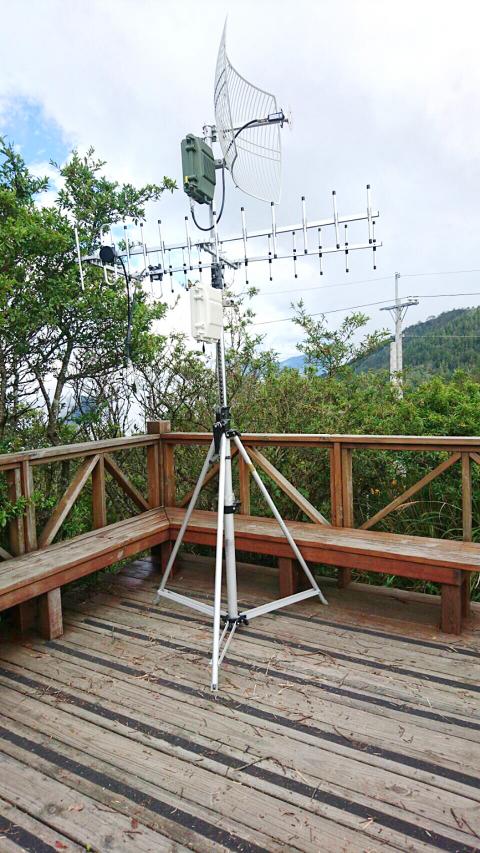Two employees of Tsung Chen Technologies (TC Tech) accused of violating the Classified National Security Information Protection Act (國家機密保護法) had their indictments delayed by the Shilin District Court yesterday because they cooperated with prosecutors and their actions did not endanger national security, while a third employee will not face charges.
A police patrol in August last year came across a man, later identified as a TC Tech assistant, sitting in a parking lot with an antenna pointed toward a military radar station near the Xiaoyoukeng Recreation Area on Yangmingshan (陽明山) in Taipei, the court said.
Ministry of National Defense personnel sent to the parking lot to investigate determined that the equipment was manufactured by National Instruments and was capable of detecting, analyzing and recording spectrum measurements.

Photo reproduced by Huang Chieh, Taipei Times
The assistant and two TC Tech officials at the scene, a manager surnamed Lin (林) and an engineer surnamed Hsu (許), were placed under investigation for suspected treason, while the equipment, valued at NT$2 million (US$66,664 at the current exchange rate), was taken by the military for examination.
After a year of analyzing the data recorded on the machine, the military said unique signals of multiple military transmissions had been recorded as the users signal-hopped between frequencies.
Prosecuors said the equipment had been placed at the exact location where it could pick up military transmissions, but the information recorded was not of sensitivity that it threatened the government or could incite social unrest.
For that reason, prosecutors said they charged the trio with contravening the act, but not with treason.
Lin and Hsu said TC Tech was bidding for a contract to procure radio equipment for the Chungshan Institute of Science and Technology and they were simply testing the equipment, but they pleaded guilty to contravening the law, the court said.
The assistant said he had only set up the equipment under Lin and Hsu’s instructions and did not know what they wanted to use it for, the court said.
As there is no proof that Lin and Hsu had divulged any of the recorded information to China or other nations, and they cooperated with authorities, the court decided to not to indict them at this time.
However, the court reminded the public that such acts could be punishable by up to five years in prison.
It also called on individuals and companies not to try to monitor electronic signals from military facilities.

Chinese Nationalist Party (KMT) Chairman Eric Chu (朱立倫), spokeswoman Yang Chih-yu (楊智伃) and Legislator Hsieh Lung-chieh (謝龍介) would be summoned by police for questioning for leading an illegal assembly on Thursday evening last week, Minister of the Interior Liu Shyh-fang (劉世芳) said today. The three KMT officials led an assembly outside the Taipei City Prosecutors’ Office, a restricted area where public assembly is not allowed, protesting the questioning of several KMT staff and searches of KMT headquarters and offices in a recall petition forgery case. Chu, Yang and Hsieh are all suspected of contravening the Assembly and Parade Act (集會遊行法) by holding

PRAISE: Japanese visitor Takashi Kubota said the Taiwanese temple architecture images showcased in the AI Art Gallery were the most impressive displays he saw Taiwan does not have an official pavilion at the World Expo in Osaka, Japan, because of its diplomatic predicament, but the government-backed Tech World pavilion is drawing interest with its unique recreations of works by Taiwanese artists. The pavilion features an artificial intelligence (AI)-based art gallery showcasing works of famous Taiwanese artists from the Japanese colonial period using innovative technologies. Among its main simulated displays are Eastern gouache paintings by Chen Chin (陳進), Lin Yu-shan (林玉山) and Kuo Hsueh-hu (郭雪湖), who were the three young Taiwanese painters selected for the East Asian Painting exhibition in 1927. Gouache is a water-based

Taiwan would welcome the return of Honduras as a diplomatic ally if its next president decides to make such a move, Minister of Foreign Affairs Lin Chia-lung (林佳龍) said yesterday. “Of course, we would welcome Honduras if they want to restore diplomatic ties with Taiwan after their elections,” Lin said at a meeting of the legislature’s Foreign Affairs and National Defense Committee, when asked to comment on statements made by two of the three Honduran presidential candidates during the presidential campaign in the Central American country. Taiwan is paying close attention to the region as a whole in the wake of a

OFF-TARGET: More than 30,000 participants were expected to take part in the Games next month, but only 6,550 foreign and 19,400 Taiwanese athletes have registered Taipei city councilors yesterday blasted the organizers of next month’s World Masters Games over sudden timetable and venue changes, which they said have caused thousands of participants to back out of the international sporting event, among other organizational issues. They also cited visa delays and political interference by China as reasons many foreign athletes are requesting refunds for the event, to be held from May 17 to 30. Jointly organized by the Taipei and New Taipei City governments, the games have been rocked by numerous controversies since preparations began in 2020. Taipei City Councilor Lin Yen-feng (林延鳳) said yesterday that new measures by